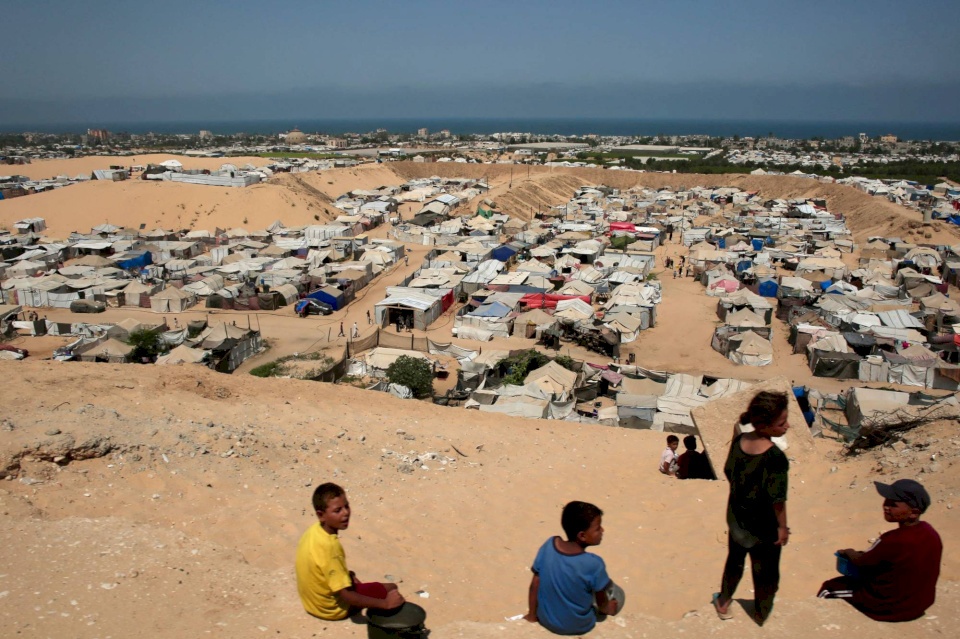
What Cameras Don't Capture .. A Living Testimony of the Life of the People of Gaza!
SadaNews - Anyone who knew him, especially veteran journalists, was familiar with Fathi Sabah, the seasoned reporter and journalist who was always full of life, despite the illnesses that afflicted him and his family for years.
But what Sabah wrote is just a small snippet of a suffering that is neither truly depicted nor captured by the lenses of cameras in their real and tragic sense.
In "SadaNews," we present to you what Sabah wrote under the title: "The Tent of Slow Death."
Sabah writes in words that carry the dialect, often characteristic of Palestinians: "It has been more than 5 months since we last had red meat, chicken, eggs, dairy, fish, fruits, and vegetables (except for a very minimal amount of vegetables), and cheese except for one or two types that came in a few days ago."
And with the temperature rising to 34 degrees Celsius (feels like 41 degrees Celsius according to the weather app), and the humidity index reaching about 60%, you feel while in the tent that you are dying slowly and that your soul is leaving your body in slow motion, and that your body has become exhausted and collapsed and you can’t do anything, even though you are required to light a fire for breakfast and lunch, for the sake of compassion and kindness to your wife, who cannot bear sitting in front of the fire that resembles the fire of hell, after washing, drying, cleaning, kneading dough and baking it, among other impossible tasks.
He adds with a lump in his throat that every Gazan feels: "You feel your bones have become weak and brittle and your joints crack like the sound of old wooden doors. You have no desire to do anything, even speaking is a challenge, and you feel suffocated and have difficulty breathing. You go light a cigarette of the lowest quality and feel even more suffocated. You ask your son to go buy food and household supplies, and he tells you there’s no cash available, and the cash liquidation fee has reached 35% (previously it was 50%). You feel miserable, disgusted, and frustrated at the thought of anything changing, or there being a truce or ending the war.
He continues: "At night, you sit in the street with your neighbors and find them sharing their worries with each other and with you, and you don’t even know who to share your burdens with. Every now and then, someone says, ‘A light (a flash from bomb dropping planes) just appeared,’ and then you hear an enormous explosion in Khan Younis or Rafah."
He continues: "You decide in the middle of the night to go to sleep, but you find the fabric of the tent hot as if it was made of iron placed on a fire. So, you go back to the street hoping to find a breeze that cools you down but you don't find it. You ask yourself, ‘Could it be that Fairouz was always making fun of us singing that the wind blows on us while there is no wind even though we are near the sea?’"
He continues, his heart filled with sorrow and pain like any Gazan: "You find someone complaining to God to relieve us from this torment, and another telling him that suffering in this world is better than suffering tomorrow (on the Day of Judgment) when a serpent will come in the grave to strike you down 70 arms’ length. You find a third person saying that God will not punish us on the Day of Judgment because He has seen how much we have suffered during this war and long before the war too."
He continues: "You leave them and go back to the tent and find it still lit and steaming. You throw yourself on the mattress and find it hot, and of course, there is no electricity or fans to help you sleep. You keep turning on the mattress as if you are a skewer of meat or chicken being roasted on the fire, and you remember that you haven’t eaten meat in 5 months, and instead of receiving meat and chicken, you feel like you have become roasted chicken over the blazing fire of August.
And he said: "You remember what many Palestinians and Arabs wrote on Facebook and social media about your legendary resilience and how you are a mountain capable of enduring a war for five years or fifty years, and you hear them praising you and singing about your patience and endurance, so you laugh to yourself and say: ‘I swear I cannot even respond to your words nor can I bear the continuation of the war for five minutes.’ And then you find yourself asleep from exhaustion and fatigue and wake up after an hour or two to find yourself sweating and drowning in your sweat, remembering that everyone left you since the start of the war and you have to fend for yourself, while those who wrote on Facebook are now sleeping in their soft beds under air conditioning and have electricity, water, food, drinks, and money, so you feel frustrated and eventually drift off to sleep against your will."

High-level sources reveal to SadaNews: Washington seeks to hold a Gaza Reconstruction Conf...

Israel Hayom: Israel-UAE Relations in Continuous Decline

Yedioth Ahronoth: Israel Spends Tens of Millions on Armed Gangs in Gaza

SadaNews Obtains Its Literal Article: Olmert: Israel Supports Ethnic Cleansing in the West...

Sources to SadaNews: Israel Refuses to Grant the National Committee Access to Gaza

Russian Newspaper Reveals: Why Trump Backed Down from Striking Iran?

In Pictures: Details of the Verdict Issued Against Nazmi Muhanna and His Wife

